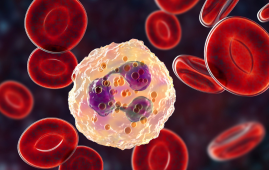

An innovative research has shown that combining five existing medications can keep a very aggressive kind of bone marrow cancer at bay for longer.
For more than three-quarters of “ultra-high-risk” myeloma patients, the new five-drug cocktail, combined with a stem cell transplant, put the malignancy at bay for two and a half years. In comparison, just around half of patients on the current standard of therapy survived that long without their bone marrow cancer progressing.
The MUK Nine OPTIMUM trial, co-led by The Institute of Cancer Research, London, the University of Leeds, and The Royal Marsden NHS Foundation Trust, is the first of its kind in myeloma, comparing results with an earlier trial rather than a control group.
This innovative “digital comparator” approach enables researchers to expedite comparison evidence, allowing them to find answers faster while minimizing trial expenses.
The five drugs—bortezomib, lenalidomide, daratumumab, dexamethasone, and cyclophosphamide chemotherapy—are all individually licensed and in clinical trials, which implies the combination might be available to patients rather soon if regulatory agencies approve it.
Researchers at The Institute of Cancer Research (ICR) and University of Leeds compared outcomes from 103 ultra-high-risk patients in the OPTIMUM trial treated with the five-drug cocktail and 117 ultra-high-risk patients in a separate trial known as Myeloma XI (MyXI), who were treated with the current standard of care: a different combination of four drugs—carfilzomib, lenalidomide, cyclophosphamide and dexamethasone. The most recent findings appear in the Journal of Clinical Oncology.
Ultra-high-risk myelomas relapse faster
Certain genetic abnormalities in ultra-high-risk myelomas make them more aggressive, less responsive to treatment, and more likely to relapse. These patients have extremely poor outcomes and are at a very high risk of relapsing within the first two years of diagnosis, compared to others who do not have the genetic alterations and typically remain in remission for five years or longer.
Researchers discovered that ultra-high-risk patients in the OPTIMUM study who received the five-drug combination were more likely than MyXI patients on standard treatment to remain in remission for a longer period of time before their disease progressed and their symptoms worsened.
Three-quarters (77%) of OPTIMUM patients had stable illness that was unlikely to advance in the near future at 30 months, compared to fewer than half (39.8%) of MyXI patients.
At 30 months, 83.5% of OPTIMUM trial patients who took the five-drug combination were still alive, compared to 73.5% of MyXI trial patients.
The trial’s findings suggest that using an intensified treatment approach for bone marrow comprised of five drugs could be a promising strategy for ultra-high-risk patients, emphasizing the importance of molecularly profiling patients to identify those with the high-risk form of the disease so that they can receive more intensive treatment earlier on.
Exploring a Custom Approach
Study leader Dr. Martin Kaiser, Team Leader in Myeloma Molecular Therapy at The Institute of Cancer Research, London, and Consultant Hematologist at The Royal Marsden NHS Foundation Trust, said, “Our aim is to find the best initial treatment for people with ultra-high-risk myeloma, to hopefully improve their outcomes. We have shown that a more tailored approach involving five different drugs could help treat patients with the highest-risk forms of myeloma—helping keep them alive and healthy for longer.
“We hope the NHS will now consider our findings from this trial which was designed together with patients, so that this combination can become available to high-risk myeloma patients in the U.K. and elsewhere.
“As a next generation ‘digital comparator’ trial, the OPTIMUM trial also sets a new standard for fast-tracking evidence. It is a successful proof of principle study which could help inform and speed up future studies.”
more recommended stories
 Silica Nanomatrix Boosts Dendritic Cell Cancer Therapy
Silica Nanomatrix Boosts Dendritic Cell Cancer TherapyKey Points Summary Researchers developed a.
 Vagus Nerve and Cardiac Aging: New Heart Study
Vagus Nerve and Cardiac Aging: New Heart StudyKey Takeaways for Healthcare Professionals Preserving.
 Cognitive Distraction From Conversation While Driving
Cognitive Distraction From Conversation While DrivingKey Takeaways (Quick Summary) Talking, not.
 Fat-Regulating Enzyme Offers New Target for Obesity
Fat-Regulating Enzyme Offers New Target for ObesityKey Highlights (Quick Summary) Researchers identified.
 Spatial Computing Explains How Brain Organizes Cognition
Spatial Computing Explains How Brain Organizes CognitionKey Takeaways (Quick Summary) MIT researchers.
 Gestational Diabetes Risk Identified by Blood Metabolites
Gestational Diabetes Risk Identified by Blood MetabolitesKey Takeaways (Quick Summary for Clinicians).
 Phage Therapy Study Reveals RNA-Based Infection Control
Phage Therapy Study Reveals RNA-Based Infection ControlKey Takeaways (Quick Summary) Researchers uncovered.
 Pelvic Floor Disorders: Treatable Yet Often Ignored
Pelvic Floor Disorders: Treatable Yet Often IgnoredKey Takeaways (Quick Summary) Pelvic floor.
 Urine-Based microRNA Aging Clock Predicts Biological Age
Urine-Based microRNA Aging Clock Predicts Biological AgeKey Takeaways (Quick Summary) Researchers developed.
 Circadian Control of Neutrophils in Myocardial Infarction
Circadian Control of Neutrophils in Myocardial InfarctionKey Takeaways for HCPs Neutrophil activity.

Leave a Comment